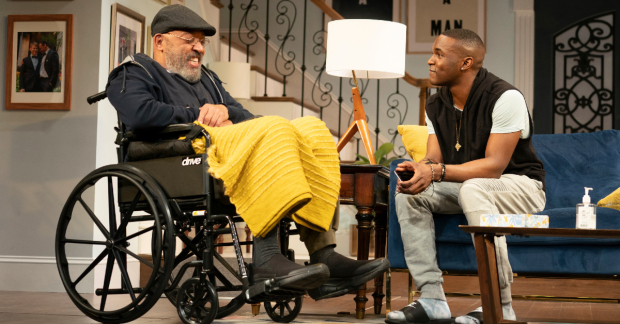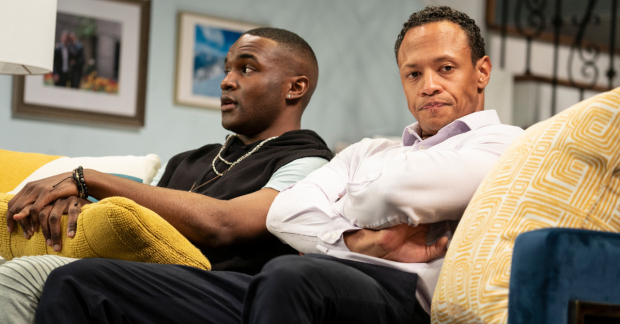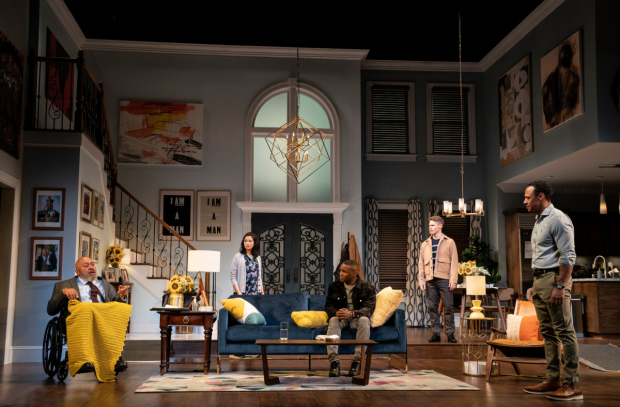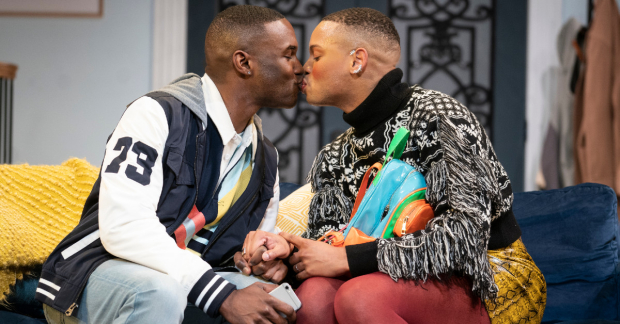Review: Three Generations of Gay Black Men Learn to Move Forward in …What the End Will Be
Mansa Ra’s new play expands our ideas of the American family — and American drama.

(© Joan Marcus)
In Mansa Ra's new play, the character Maxwell Kennedy rattles off three rules when his ailing father, Bartholomew, comes to live with him: Don't be racist, go easy on Maxwell's husband, and don't die. It's that third rule that Bartholomew dismisses quickest. "You're gonna have to take that up with Jesus," he says.
The rules we live by when we live together often end up being less stable than we intend them to be, and sometimes we have to throw them out altogether when they don't work. There's a lot of the latter in Ra's funny and incredibly moving play …what the end will be, now running in a Roundabout Theatre Company production at the Laura Pels Theatre. In its own small way, …what the end will be rewrites a lot of the rules about what we should expect from a family drama.

(© Joan Marcus)
In large part, that's because Ra does something new: He looks at the complex father-son dynamics of three generations of gay Black men, all related and all living under one roof. The head of the household, conservative-minded, career-driven Maxwell (Emerson Brooks), lives with his white husband, Charles (Randy Harrison), in a posh Atlanta home (grand set design by Reid Thompson) and has decided to provide home care for his father, Bartholomew (Keith Randolph Smith), a gay veteran with late-stage bone cancer. Eighteen-year-old athlete Tony (Gerald Caesar) bounds about the house, full of youthful energy, but he's keeping a secret from his dad: He has a boyfriend, Antoine (Ryan Jamaal Swain). Of course, the boyfriend isn't the issue; the kind of boyfriend is. But when Bartholomew makes a surprise announcement, Maxwell is forced to confront his own closeted, secretive life and open himself up to the possibility of change for the sake of his family.
In a play with straight white characters, this set-up (ailing grandparent, old-school dad, rebellious teen wanting to live their best life) would feel at least a little familiar. But Ra puts these tropes in different cultural waters, and the result is fresh and engaging. Brooks delivers a sterling performance as a man caught between his generation's passé edict to hide one's gayness and the social pressures of living under the gaze of white colleagues (and husbands). We see Brooks bring out those contradictions with a smile that quickly turns into a snarl as Maxwell renders judgment on Antoine for dressing and acting too "feminine" (Swain's fabulous attire is by Emilio Sosa, with make-up by J. Jared Janas). Ra turns this standoff between generations into 90 minutes of provocative (and hilarious) theater.

(© Joan Marcus)
While Brooks keeps us on edge wondering if Maxwell's clenched jaw is going to grind someone's bones, Smith gives us the show's standout performance as the grandfather who has done more hiding and been through more pain than anyone in the room — he knows what really matters and what doesn't. From the moment Bartholomew whips out his dead lover's boxers and gives them a good sniff, Smith keeps us in stitches throughout most of the play with his impeccable comedic timing, but later on he shows us the suffering behind Bartholomew's stoic smile in a painfully beautiful monologue that didn't leave a dry eye in the house on the night I attended (bring tissues and an extra mask). Ra does not shy away from some overtly sentimental scenes in Bartholomew's visions of his deceased ex (his "sunflower"), but those moments are easy to look past when Smith is giving one of the most powerful performances in New York right now.
Director Margot Bordelon draws terrific performances from the rest of the cast as well. Caesar shows us the perspective of a young jock torn between the repressive, hypermasculine training of his Maker's Mark-swilling father and his own generation's embrace of self-creation and sexual freedom. Meanwhile, Harrison adroitly plays a finger-wagging husband who seems blissfully unaware of his whiteness and the effect it can have on the Black men around him, even if they are family. And in an understated but solid performance, Tiffany Villarin plays the sensible nurse Chloe, who rises above the men's confrontations so that she can focus on Bartholomew and his pain.

(© Joan Marcus)
Ryan Jamaal Swain (Damon from FX's Pose) deserves a special shoutout for his memorable turn as Antoine. With his confident sashay and a flirtatious smile that lights up the theater like a thousand rainbows, Swain's performance is pitch-perfect, and the chemistry he creates with Caesar has the authentic feel of young love (Jiyoun Chang's lighting design pulls us into the play's charming romantic moments). If only Swain were onstage more, because when he is, he sparkles.
This play sparkles too (despite the occasional mushiness) because it gets to the heart of some shared human experiences that have little to do with race, sexuality, and gender, such as what it takes to let go of your own pain, and what it means to let someone you love let go of theirs — rules be damned. Ultimately, as the play's title suggest, we all know what the end will be … the ellipsis is how we get there.









